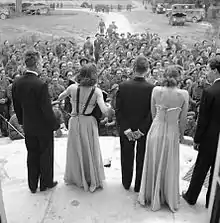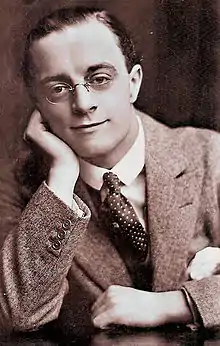Entertainments National Service Association
The Entertainments National Service Association (ENSA) was an organisation established in 1939 by Basil Dean and Leslie Henson to provide entertainment for British armed forces personnel during World War II. ENSA operated as part of the Navy, Army and Air Force Institutes. It was superseded by Combined Services Entertainment (CSE) which now operates as part of the Services Sound and Vision Corporation (SSVC).

_'glamour_girls'_distribute_cigarettes_and_beer_to_the_troops_in_North_Africa%252C_26_July_1942._E14919.jpg.webp)


The first big wartime variety concert organised by ENSA was broadcast by the BBC to the Empire and local networks from RAF Hendon in north London on 17 October 1939. Among the entertainers appearing on the bill were Adelaide Hall, The Western Brothers and Mantovani. A Newsreel of this concert showing Adelaide Hall singing We're Going to Hang out the Washing on the Siegfried Line accompanied by Mantovani and His Orchestra exists.[1]
Many members of ENSA later had careers in the entertainment industry after the war, including actors Terry-Thomas, Peter Sellers and Kenneth Connor.
In popular culture
Despite many extremely talented entertainers working for ENSA, the organisation was necessarily spread thin over the vast area it had to cover. Thus many entertainments were substandard, and the popular translation of the acronym ENSA was "Every Night Something Awful".
ENSA plays a modest role in the motion picture Love Story (1944) in which Margaret Lockwood stars as a concert pianist who makes an ENSA tour to North Africa and the Mediterranean region. The film Desert Mice (1959) follows the fictional escapades of an ENSA troop with Sid James assigned to the Afrika Korps.
The only known ENSA theatre to have survived in its original condition is the Garrison Theatre at Hurst Castle in the New Forest National Park. Created by servicemen in 1939, the proscenium arch still bears the badge and grenades of the Royal Artillery, and the curtains still hang from an original galvanised gas pipe. Shows are presented from time to time by the Friends of Hurst Castle.
References
- Mantovani: A Lifetime in Music by Colin MacKenzie, page 78: ISBN 978-1905226191
External links
| Wikimedia Commons has media related to Entertainments National Service Association. |